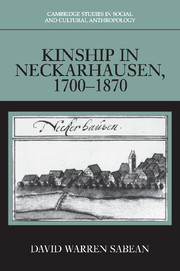Book contents
- Frontmatter
- Contents
- List of tables
- Abbreviations
- Abbreviations of sources
- On reading kinship diagrams
- Glossary
- Preface
- Introduction
- Cohort I (1700–1709)
- Cohort II (1740–1749)
- 9 Restructuring the system of alliance
- 10 Village politics at midcentury
- Cohort III (1780–1789)
- Cohort IV (1820–1829)
- Cohort V (1860–1869)
- Conclusion
- Appendix
- Bibliography
- General index
- Index of villagers
10 - Village politics at midcentury
Published online by Cambridge University Press: 04 August 2010
- Frontmatter
- Contents
- List of tables
- Abbreviations
- Abbreviations of sources
- On reading kinship diagrams
- Glossary
- Preface
- Introduction
- Cohort I (1700–1709)
- Cohort II (1740–1749)
- 9 Restructuring the system of alliance
- 10 Village politics at midcentury
- Cohort III (1780–1789)
- Cohort IV (1820–1829)
- Cohort V (1860–1869)
- Conclusion
- Appendix
- Bibliography
- General index
- Index of villagers
Summary
In 1755 the new Nürtingen Vogt, Dreher, came to Neckarhausen at the head of a ducal commission to investigate charges against Schultheiss Johann Georg Rieth. Ten Bürger had accused Rieth of a variety of offenses, including financial manipulation and mistreatment of villagers at the construction of the new Rathaus; failure to take preventative steps against river flooding; corrupt management of tithes, forestland, and sheepfolding; double bookkeeping; dining and drinking at the cost of the village; personal use of village resources (an extra garden plot and portion from the communal orchards); excessive charges, fees, and wages for conducting village business; drunkenness and quarreling; embezzlement of public funds and ducal taxes; accumulating offices; and high-handed and self-interested administration. The plaintiffs also complained that the Gericht and Rat members were all related and made up a single indivisible chain. Vogt Dreher concluded his 443-page report by noting that Schultheiss Rieth had a good reputation (Praedikat) and that he was a capable official. He did not consider the complaints to be significant – even though for this or that misdemeanor Rieth had accumulated a substantial fine of 30 Reichsthaler and had to pay half of the investigation costs (85 fl). In any event, the Vogt despaired of finding anyone else of Rieth's Capacität to run the village.
- Type
- Chapter
- Information
- Kinship in Neckarhausen, 1700–1870 , pp. 192 - 206Publisher: Cambridge University PressPrint publication year: 1997

